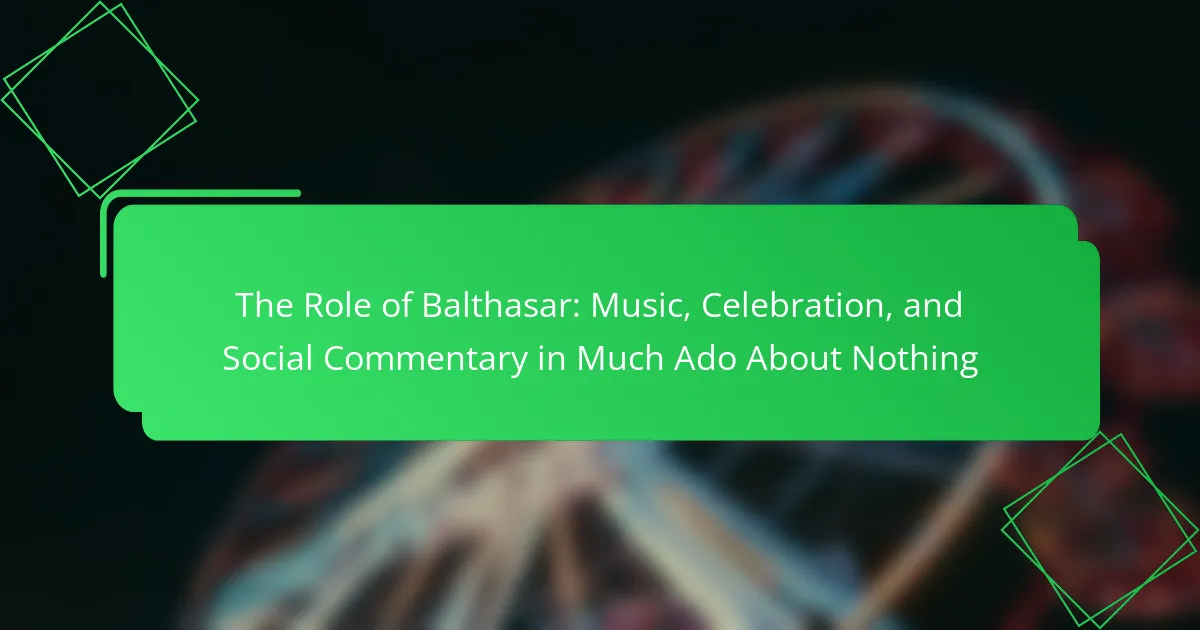
What is the Role of Balthasar in Much Ado About Nothing?
Balthasar serves as a minor character in Much Ado About Nothing. He primarily acts as a musician and provides entertainment at various events. His role includes singing and playing music, which enhances the festive atmosphere of the play. Balthasar’s performances often reflect the emotional undertones of the scenes. For example, he sings during the celebration of the marriage of Claudio and Hero. His presence contributes to the themes of love and joy. Balthasar also serves as a vehicle for social commentary through his songs. His character highlights the importance of music in social gatherings. Overall, Balthasar’s role is integral to the play’s exploration of celebration and community.
How does Balthasar contribute to the themes of music and celebration?
Balthasar contributes to the themes of music and celebration by performing songs that enhance the festive atmosphere. His musical interludes serve as a backdrop to key celebratory moments in the play. For instance, Balthasar’s song during the wedding scene underscores the joy and revelry of the occasion. Additionally, his music acts as a catalyst for character interactions, promoting a sense of unity among the guests. The lyrics often reflect themes of love and merriment, aligning with the overall celebratory tone of the narrative. Balthasar’s role as a musician emphasizes the importance of music in social gatherings, reinforcing the idea that music is integral to human connection and celebration.
What specific musical elements does Balthasar introduce to the play?
Balthasar introduces several specific musical elements to the play. He incorporates songs that enhance the themes of love and celebration. These musical interludes serve to elevate the festive atmosphere during key moments. Balthasar’s performances often include lyrical content that reflects the characters’ emotions. The melodies are typically light-hearted and engaging, inviting audience participation. Additionally, the use of music in Balthasar’s scenes provides social commentary on the events unfolding in the play. His musical contributions underscore the interplay between joy and conflict, particularly in romantic relationships. The songs also act as a narrative device, advancing the plot and deepening character development. Overall, Balthasar’s musical elements are integral to the play’s exploration of love and social dynamics.
How do Balthasar’s performances enhance the celebratory atmosphere?
Balthasar’s performances enhance the celebratory atmosphere by infusing joy and energy into the scenes. His music creates an uplifting environment during key moments in “Much Ado About Nothing.” The lively tunes encourage audience participation and engagement. This interaction fosters a sense of community among the characters and the audience. Balthasar’s songs often reflect themes of love and festivity, reinforcing the joyous occasion. Additionally, his presence serves as a reminder of the celebratory context of the play. The use of music in his performances underscores the importance of celebration in the narrative. Overall, Balthasar’s role is pivotal in maintaining a vibrant and festive atmosphere throughout the play.
What social commentary does Balthasar provide in the play?
Balthasar provides social commentary on the nature of love and relationships in “Much Ado About Nothing.” Through his songs, he highlights the complexities and challenges of romantic connections. His music reflects societal expectations and the often superficial nature of courtship. Balthasar’s performance serves as a critique of the characters’ actions and motivations. He underscores themes of deception and misunderstanding prevalent in the play. His observations prompt the audience to reflect on the authenticity of love. This commentary is woven into the fabric of the narrative, enhancing the play’s exploration of social dynamics. Balthasar’s role as a musician amplifies the emotional resonance of these themes.
How does Balthasar’s character reflect societal norms and values?
Balthasar’s character reflects societal norms and values through his role as a musician and entertainer. He embodies the importance of music in social gatherings during the Elizabethan era. His performances highlight the celebration of love and relationships, aligning with societal expectations of courtship. Balthasar also serves as a commentator on the events around him, providing insight into the behaviors of other characters. His songs often contain messages that critique or reinforce social norms. For example, his song “Sigh No More” promotes the idea of love’s transience, which resonates with contemporary views on romance. By engaging with the audience, Balthasar reinforces the communal values of joy and celebration, essential in maintaining social cohesion. His character illustrates how art and entertainment reflect and shape societal attitudes.
What messages about love and relationships are conveyed through Balthasar’s actions?
Balthasar’s actions convey messages about the complexity and celebration of love and relationships. His role as a musician highlights the joy and festivity associated with love. Through song, he emphasizes the emotional highs and lows that accompany romantic connections. Balthasar’s performances serve as a commentary on the social dynamics of love, showcasing both its beauty and its challenges. His music often reflects the themes of reconciliation and unity, reinforcing the idea that love can triumph over adversity. By engaging with the characters, Balthasar illustrates the importance of community in nurturing relationships. His actions suggest that love is not just a personal experience but also a shared celebration within society.

How does Balthasar’s role evolve throughout Much Ado About Nothing?
Balthasar’s role evolves from a minor character to a significant social commentator. Initially, he serves as a musician at the celebrations in Messina. His music provides a backdrop for the unfolding events and contributes to the festive atmosphere. As the play progresses, Balthasar’s presence becomes more prominent during key moments. He sings the song “Sigh No More,” which reflects themes of love and deception. This song serves as a vehicle for social commentary on relationships. Balthasar’s role highlights the contrast between appearance and reality in the play. Ultimately, he embodies the connection between music and the narrative’s emotional undertones. His evolution underscores the importance of music in conveying deeper meanings within the story.
What key moments define Balthasar’s character development?
Balthasar’s character development is defined by several key moments. His introduction as a musician establishes his role in the social fabric of the play. Balthasar’s performance at the masked ball showcases his ability to facilitate social interactions. His song during the wedding scene serves as a poignant commentary on love and deception. Additionally, Balthasar’s involvement in the plot to expose Claudio’s mistreatment of Hero highlights his moral stance. These moments collectively illustrate his evolution from a mere entertainer to a voice of social critique.
How does Balthasar’s involvement in the plot impact other characters?
Balthasar’s involvement in the plot significantly impacts other characters by serving as a catalyst for key events. His musical performances create a festive atmosphere that influences the mood of the characters. For instance, during the masquerade, Balthasar’s singing encourages the playful interactions between Beatrice and Benedick. This interaction ultimately leads to their romantic development. Additionally, his role in the wedding scene heightens the tension when Claudio publicly shames Hero. Balthasar’s presence underscores the themes of love and deception, affecting how characters perceive each other. His music often reflects the emotional state of the characters, enhancing their experiences. Overall, Balthasar’s contributions shape the dynamics and relationships within the narrative.
What changes occur in Balthasar’s perspective as the story progresses?
Balthasar’s perspective shifts from a mere observer to an active participant in the unfolding events. Initially, he serves as a musician, providing entertainment without deep involvement in the plot. As the story progresses, Balthasar becomes more aware of the social dynamics around him. He begins to understand the implications of love and deception among the characters. This awareness influences his interactions and the songs he chooses to perform. His music starts to reflect the underlying themes of love and conflict. By the end, Balthasar’s role transcends entertainment, becoming a vehicle for social commentary. His perspective embodies a blend of celebration and critique of the relationships in the play.
What is the significance of Balthasar’s music in the context of the play?
Balthasar’s music serves as a crucial element in the play, enhancing the themes of celebration and social commentary. His songs provide entertainment during key social gatherings, such as the wedding feast. This entertainment reflects the joyous atmosphere of the events while also highlighting underlying tensions among the characters. Balthasar’s music often carries deeper meanings, addressing issues of love, betrayal, and societal expectations. For instance, the lyrics can serve as a commentary on the romantic entanglements of the main characters. By integrating music into the narrative, Balthasar underscores the contrast between public celebration and private conflict. His role as a musician enables the audience to engage with the emotional landscape of the play. Overall, Balthasar’s music enriches the play’s exploration of relationships and societal norms.
How does the music performed by Balthasar contribute to the narrative structure?
The music performed by Balthasar enhances the narrative structure by providing emotional depth and context. It serves to underscore pivotal moments in the play. For instance, his songs often reflect the characters’ inner feelings and relationships. This alignment creates a more immersive experience for the audience. Additionally, Balthasar’s music introduces themes of love and conflict. These themes are central to the plot of “Much Ado About Nothing.” The lyrics often comment on the actions of the characters, offering social commentary. This commentary enriches the narrative by adding layers of meaning. Overall, Balthasar’s music is integral to the storytelling process.
What emotional responses are elicited from the audience through Balthasar’s songs?
Balthasar’s songs elicit a range of emotional responses from the audience, including joy, nostalgia, and introspection. The joyful melodies create a celebratory atmosphere, enhancing the festive mood of the play. Nostalgia arises from the lyrical content, which often reflects themes of love and longing. This connection to personal experiences deepens audience engagement. Introspection is prompted by the songs’ contemplative nature, encouraging reflection on relationships and societal norms. Balthasar’s music serves to heighten the emotional landscape of “Much Ado About Nothing,” making the audience more receptive to the unfolding drama.

What can we learn from Balthasar’s role in Much Ado About Nothing?
Balthasar’s role in Much Ado About Nothing highlights the importance of music and social interaction. He serves as a musician and entertainer, providing a backdrop for key events. His songs reflect the themes of love and celebration in the play. Balthasar also acts as a catalyst for character interactions. For instance, his performance at the wedding emphasizes the joy of union. Additionally, his involvement showcases social commentary on class and relationships. Balthasar’s presence illustrates how music can influence mood and perception. Overall, he enriches the narrative by blending entertainment with deeper social insights.
How can Balthasar’s character inform modern interpretations of the play?
Balthasar’s character serves as a lens for modern interpretations of “Much Ado About Nothing.” He embodies the themes of music and celebration, which resonate with contemporary audiences. Balthasar’s role as a musician highlights the importance of art in social interactions. His songs often reflect the emotional states of other characters, providing insight into their motivations. This connection allows modern viewers to explore the significance of music in relationships. Additionally, Balthasar’s presence as a servant challenges social hierarchies, prompting discussions about class and status. His character encourages audiences to consider the impact of social commentary within the play’s festive context. Overall, Balthasar’s multifaceted role informs a deeper understanding of the interplay between celebration and societal norms in the narrative.
What lessons about celebration and social interaction can be derived from Balthasar’s role?
Balthasar’s role in “Much Ado About Nothing” demonstrates the importance of music in celebration and social interaction. He uses music to enhance festive occasions, creating an atmosphere of joy. His performance serves as a catalyst for engagement among characters. Music encourages communal experiences, fostering connections between individuals. Balthasar’s presence highlights the role of entertainment in social gatherings. Celebrations are enriched by artistic expression, promoting unity and shared enjoyment. His interactions exemplify how music can bridge social divides. Overall, Balthasar illustrates that celebration and social interaction are deeply intertwined through the medium of music.
What are some practical insights for analyzing Balthasar’s character?
Balthasar is a character in Much Ado About Nothing known for his role as a musician and messenger. He provides insights into the social dynamics of the play. Balthasar’s music serves as a vehicle for celebration and commentary on love. His songs reflect the themes of joy and melancholy present in the narrative.
Analyzing Balthasar’s interactions reveals his position within the social hierarchy. He engages with both noble characters and commoners, highlighting class distinctions. His performance at the wedding underscores the significance of music in social gatherings. Balthasar’s character also offers a lens through which to view the attitudes toward love and relationships in the play.
His presence adds depth to the exploration of romantic ideals and societal expectations. Through Balthasar, the audience gains insight into the cultural practices of the time. His role emphasizes the importance of music as a form of expression and connection among characters.
The main entity of this article is Balthasar, a minor character in Shakespeare’s “Much Ado About Nothing,” who serves as a musician and entertainer. The article examines Balthasar’s role in enhancing the themes of music, celebration, and social commentary throughout the play. It details how his performances contribute to the festive atmosphere, reflect societal norms, and provide insight into the complexities of love and relationships. Additionally, the article explores Balthasar’s character development and the significance of his music in shaping the narrative and emotional responses of the audience.


